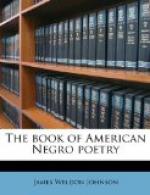“Alas! and am I born for this,
To wear this slavish chain?
Deprived of all created bliss,
Through hardship, toil, and pain?
* * * * *
Come, Liberty! thou cheerful sound,
Roll through my ravished ears;
Come, let my grief in joys be drowned,
And drive away my fears.”
In Mrs. Harper we find something more than the complaint and the longing of Horton. We find an expression of a sense of wrong and injustice. The following stanzas are from a poem addressed to the white women of America:
“You can sigh o’er the
sad-eyed Armenian
Who weeps in her desolate home.
You can mourn o’er the exile of Russia
From kindred and friends doomed to roam.
* * * * *
But hark! from our Southland are
floating
Sobs of anguish, murmurs of pain,
And women heart-stricken are weeping
O’er their tortured and slain.
* * * * *
Have ye not, oh, my favored sisters,
Just a plea, a prayer or a tear
For mothers who dwell ’neath the shadows
Of agony, hatred and fear?
* * * * *
Weep not, oh my well sheltered
sisters,
Weep not for the Negro alone,
But weep for your sons who must gather
The crops which their fathers have sown.”
Whitman, in the midst of “The Rape of Florida,” a poem in which he related the taking of the State of Florida from the Seminoles, stops and discusses the race question. He discusses it in many other poems; and he discusses it from many different angles. In Whitman we find not only an expression of a sense of wrong and injustice, but we hear a note of faith and a note also of defiance. For example, in the opening to Canto II of “The Rape of Florida”:
“Greatness by nature cannot
be entailed;
It is an office ending with
the man,—
Sage, hero, Saviour, tho’
the Sire be hailed,
The son may reach obscurity
in the van:
Sublime achievements know
no patent plan,
Man’s immortality’s
a book with seals,
And none but God shall open—none
else can—
But opened, it the mystery
reveals,—
Manhood’s conquest of
man to heaven’s respect appeals.
“Is manhood less because man’s face is black?
Let thunders of the loosened seals reply!
Who shall the rider’s restive steed turn back,
Or who withstand the arrows he lets fly
Between the mountains of eternity?
Genius ride forth! Thou gift and torch of heav’n!
The mastery is kindled in thine eye;
To conquest ride! thy bow of strength is giv’n—
The trampled hordes of caste before thee shall be driv’n!
* * * * *
“’Tis hard to judge if hatred of one’s race,
By those who deem themselves superior-born,
Be worse than that quiescence in disgrace,
Which only merits—and should only—scorn.
Oh, let me see the Negro night and morn,
Pressing and fighting in, for place and power!
All earth is place—all time th’ auspicious hour,
While heaven leans forth to look, oh, will he quail or cower?




